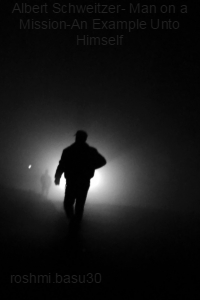
Once in a great rarity there appears a bright unique star which leaves behind it’s luminous essence down the ages, serving humanity and giving it hope and a will to aspire for a better world for themselves; to be "high on life". That’s Albert Schweitzer the messiah, who was all about God’s most precious gift to humanity.
Schweitzer’s biggest contribution to the cause of a rejuvenated, spiritually awakened and ethically disposed civilization of mankind was that he was an example unto himself as a spiritually enlightened ethical person who was completely devoted to serve humanity through his writings, his philosophy, his theology, his music, and above all, through his “healing touch” as a doctor and an activist. His thoughts which often were characterized by uncomplimentary and even starkly contrasting trends (like mysticism and rationalism) did make him appear too complex for comprehension at times. But, his intense urge to aid the old, ailing and needy, his reverence towards God’s most valuable creation- the “life” and his untiring effort and activities to serve man, makes him a man who touches men where they feel the most-their hearts! Langfeldt beautifully describes him as he writes “Albert Schweitzer cannot be described. He must be experienced.” Georges Marchal in his study of Albert Schweitzer, calls him a “legend in his lifetime” who combined “the Olympian grandeur of a Goethe with the fresh and smiling quality of a St. Francis of Assissi”. He, Marchal further writes about him, “outlined on our horizon as an indomitable witness of the Spirit”. Indeed no one served the cause of ethics and righteousness more sincerely than him. His kindness, sympathy, self-sacrifice, diligence, honesty of purpose radiated as he smilingly gave up the opulence and comfort of Europe to embrace tough struggle to keep alive the battered and poverty stricken “Lambarene” in remote Africa. He never ever hesitated to help his destitute German friends after the armistice was signed following the First World War, even in the face of an impending threat of severe wartime persecution. For him friendship had the strength of religion. With an absolute sincerity of purpose and commendable faithfulness towards his own beliefs, he undertook to serve the world with his kindness, sensitivity and sympathy for all things living. His vindication of his own ideal of “reverence for life” was the biggest inspiration for others.
Albert Schweitzer “respected life”. This extended to all things that had life and not man alone. In the memoirs that he wrote on his childhood days, he expressed anguish about the pain of an old limping horse. Elsewhere he showed doubt whether the “wild animal taming” disciplining of his recalcitrant pet dog was at all justified. He expressed disaffection for fishing as a sport and clearly expressed discontent in taking life simply for the pleasure of doing so. The sensitive consideration of a man whose heart had the rare ability to feel the anguish of every pained living soul- mankind and otherwise, endowed Schweitzer with an indomitable Spirit which radiated all around. Jacques Feschotte writes, “His warm heart radiates that positive, illimitable love which is based on reverence for life; and in all that he does, reverence for life not only ensures for him an universal audience but makes of him , for all mankind, an incomparably important human being, and one whose goodness-in-action has no end.”
Schweitzer was a highly acclaimed man all across Europe-in Sweden, Switzerland, France, and Germany. His highly authentic lectures on the problems plaguing humanity were almost reverentially accepted there. He experienced name, fame, acclamation,-all in Europe. Yet he flouted opulence and fame to go in an undependable adventure to the jungle-to practice medicine in Equatorial Africa to serve the cause of poverty stricken lot there; to rebuild the ruined hospital of the battered and poverty stricken Lambarene which he ultimately could achieve in 1945, though with American aid. In the meanwhile the story of his life from 1924 (when he left Europe for Africa) to 1945, remained that of intense struggle to resuscitate a ruined place and serving the backward people of the region, trying to bring enlightenment in the dark abyss where they lived. He, in the process addressed many economic or sociological problems of the natives. He even sought to deal with such problems like polygamy among the fellow African natives. All along he sought to awaken the natives to a moral awareness and thoughtful considerations in all aspects of life whereby reverence for life and doctrines of love are truly vindicated even in the ignorant plight of a backward African place. It was largely through his tireless effort that “religion” of true Christian faith slowly became more comprehensive and less remote to the natives largely through a process of mere meditation. Jacques Feschotte writes in his tribute to Schweitzer that Albert Schweitzer had great understanding of native incapacity to understand the Bible properly. With the primeval forest all around him, Albert Schweitzer recaptures the timeless essence of the Gospels and explained it to the ignorant masses. Thus, he, through his preaching of reverence for life and doctrines of love introduced the ignorants to the hope for a better world manifesting in the “Kingdom Of Heaven”.
Schweitzer’s moral commitment towards the simple unenlightened illiterate, poor and backward natives of Africa stands out strongly as he writes in his “On the Edge of the Primeval Forest”, “we have no right to colonize if we lack the moral authority to influence our subject people for good.” Thus, he denounces any moral justification of colonial rule if it fails to deliver the subjects from their miseries.
Schweitzer’s sensitive attachment to the land where the light of civilization had still not made any headway, where the anguished wails of the ignorant poor and ailing could be heard all the time, was unmistakable. Jacques Feschotte recalls, how on a visit to the great moralist at the Munster Valley in the foothills of Vosges, he found Schweitzer constantly pondering about what perhaps was happening at the time in the land of his service. Words had poured out from Schweitzer, It’ll be quiet at Lambarene too…..There’ll be a sleepy feeling in all the huts, except where there are people who cry out in pain. All animals are asleep……”. Indeed, not many men could identify with the needy and the poor as much as Schweitzer did. For him it was service not to a nation but to the mankind as a whole. He reached out to humanity; served wherever “civilization” was in danger or had failed to bloom to its complete potential.
Jacques Feschotte pays his ultimate tribute to the man who had served the cause of “morals” completely. He writes, “When Schweitzer walks out of his house, strong and upright as ever in his suit of semi-medical semi-personal black, he holds out his hand as a reigning monarch puts forth his sceptre…..Schweitzer, who has spent nearly all his life in the company of the poorest and humblest of men is a natural leader and that is why in all his innumerable activities, he has been able to build, and organize and direct.
But when he bends over one of his patients, or steers an inoffensive insect out of harm’s way, he is St. Francis of Assissi”.
Strong and kind, upright and compassionate, rational and mystical, philosopher and activist-Schweitzer remained above all a stalwart who served humanity and touched hearts. He cured souls as much as he cured bodies. This probably leads to his acceptability across the world, cutting across the narrow confines of differences in race, culture or religious aspirations. Infact, more has been written about him in Japanese than in French. Indeed, Schweitzer lived and served humanity in accordance with all the moral ideals that he believed in. Though subjected to much controversy about his religious fidelity or otherwise, or even betraying marked susceptibility to ambiguity at times, Schweitzer’s contribution to the cause of a rejuvenated civilization is immense. His greatest gift to the cause of righteous social reconstruction of man lay in the fact that he provided one and all with “a living source of encouragement”- an encouragement to restore the ethical strength and moral disposition to the troubled human society which would make the world a better place to live in. They do not, indeed, make men like him anymore!!
About the Author






Comments